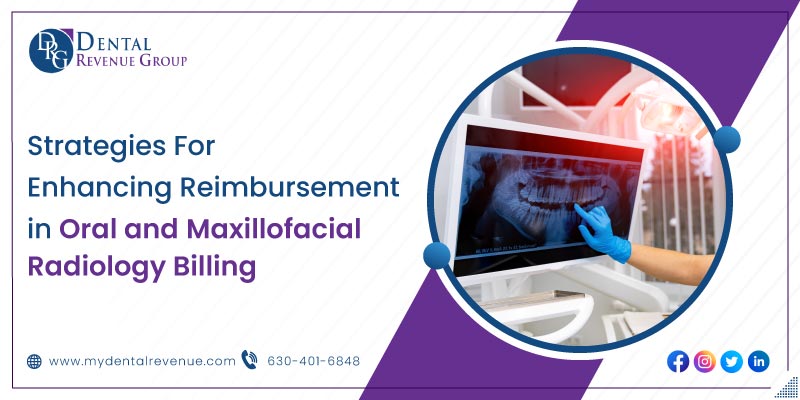Oral and maxillofacial radiology plays a crucial role in diagnosing and treating dental and facial conditions. As a specialized field, oral and maxillofacial radiology practices need effective billing strategies to ensure proper insurance reimbursement. In this blog post, we will discuss some key strategies that can help optimize the insurance reimbursement process in oral and maxillofacial radiology billing services.
Understanding the Importance of Insurance Reimbursement
Insurance reimbursement is crucial for medical providers to ensure fair service compensation. Reimbursement methods include fee-for-service, bundled payments, and capitation, each with advantages and drawbacks. Despite its significance, the reimbursement process presents challenges like payment schedules, denials, billing codes, audits, and dealing with services not covered by insurance, all of which can have negative financial implications for medical practices.
The world of healthcare reimbursement has grown more complex, leading to continuous conversations. Almost all medical providers take some kind of insurance, but a few don’t. Here’s how reimbursement usually works: After you see a doctor or get a test, the healthcare provider sends the bill to your insurance. The insurance can give you money back or pay the provider directly. The insurance talks to the provider about how much to pay. Some hospitals won’t work with certain insurances if they pay too little.
Remember, “coverage” doesn’t always mean the insurance pays everything. Usually, insurance helps with most of the bill, but you might still need to pay a copayment or coinsurance as stated in your plan. Remember, when you get a bill, it should show the service name, the total cost, and the money you need to pay from that total.
Proven Strategies For Enhancing Reimbursement in Oral and Maxillofacial Radiology Billing
Here are the following strategic approaches to effectively address common challenges in insurance reimbursement for oral and maxillofacial radiology billing services:
Stay Updated with Coding Guidelines
Insurance reimbursement relies heavily on accurate coding. Familiarize yourself and your billing team with the specific coding guidelines for oral and maxillofacial radiology procedures. Understanding the correct use of CPT (Current Procedural Terminology) codes and ICD (International Classification of Diseases) codes is important to avoid claim denials or rejections. Precise billing codes play a vital role in optimizing insurance reimbursement. These codes are employed to precisely identify the services offered and the diagnosis/treatment plan for clients. Incorrect or partial codes can lead to reimbursement delays or denial of coverage. It’s crucial to stay updated on the latest guidelines and regulations to ensure code accuracy. This information can be obtained from professional bodies or by contacting the insurance company directly.
Know Your Insurance Policies
A fundamental strategy in optimizing insurance reimbursement within oral and maxillofacial radiology billing involves a comprehensive understanding of the policies maintained by your partnered insurance companies. Each insurance provider operates with distinct guidelines and reimbursement requisites, underscoring familiarity’s importance. For instance, specific diagnoses or treatment plans might be prerequisites for coverage by certain insurers, while others might impose limitations on the covered sessions or treatment modalities. This awareness empowers you to tailor treatment plans and documentation to align with the insurance company’s criteria. To delve deeper, referencing your insurance contract, exploring the insurer’s website—particularly their provider resources section—or engaging with an insurance provider representative can provide valuable insights into these policies, facilitating a more effective reimbursement process.
Document Patient Information Thoroughly
Complete and accurate documentation is crucial for successful insurance reimbursement. Make sure to gather all relevant patient information, including demographics, insurance details, and medical history. Document the radiographic examination findings and any clinical indications supporting the need for the procedure. Proper documentation helps justify the claims and ensures insurance companies have all the necessary information to process reimbursement requests.
Comprehensive records are crucial for optimizing insurance reimbursement. Extensive documentation is often necessary to back up your billing codes and treatment strategies for oral and maxillofacial radiology procedures.
Verify Insurance Coverage and Benefits
Before providing oral and maxillofacial radiology services, verifying the patient’s insurance coverage and benefits is important. This step helps understand the insurance company’s policies, including pre-authorization requirements, coverage limitations, and reimbursement rates. Knowing the insurance coverage details in advance allows you to set accurate expectations for the patient and your practice.
Submit Clean Claims
Accuracy and timeliness are essential when submitting claims. Ensure that all the required fields are completed correctly, and double-check for any errors or missing information before submitting the claim. Utilize electronic claim submission whenever possible to minimize errors and speed up the reimbursement process. Regularly review and update your claim submission process based on feedback from insurance companies to optimize reimbursements.
Understand the Appeals Procedure
Regrettably, insurance providers often reject or inadequately compensate claims for mental health care. Knowing the appeals process and how to challenge a denied or insufficiently paid claim is vital if faced with such a situation. Every insurer has its distinct appeals protocol, making it crucial to familiarize yourself with their rules and prerequisites. You might be asked to furnish extra documents or proof to back your appeal. Enlisting the assistance of an attorney or another expert to review your appeal before submission is also a prudent step.
Appeal Denials and Follow-Up on Outstanding Claims
Claims can sometimes be denied or delayed due to various reasons. Develop a robust system for tracking and following up on unpaid claims. Promptly address any claim denials, review their reasons, and determine if an appeal is necessary. Establish effective communication channels with insurance companies to resolve any claim issues promptly.
Stay Updated with Reimbursement Policies and Industry Changes
Insurance reimbursement policies and guidelines are subject to change. Stay informed about any changes or updates relevant to oral and maxillofacial radiology billing. Regularly review and update your billing practices to align with the latest requirements set by insurance providers.
Conclusion
Optimizing insurance reimbursement in oral and maxillofacial radiology billing services requires a proactive and systematic approach. Adhering to these strategies will help ensure a smoother and more efficient insurance reimbursement process for oral and maxillofacial radiology services.
Remember, it is always advisable to consult with a dental billing company specializing in oral and maxillofacial radiology billing to tailor these strategies to your specific practice needs.











